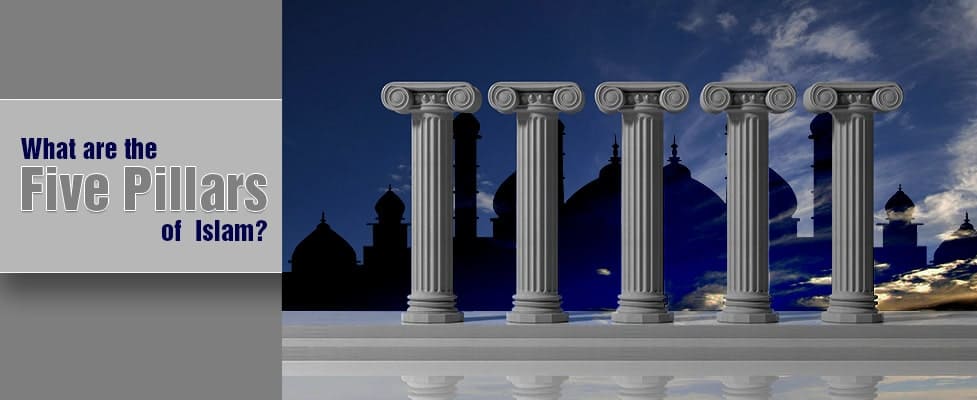What are the Five Pillars of Islam?
March 08,2018 - Published 7 years ago

Value of a thing is determined by the benefits it provides. Islam and its benefits for humanity are countless. Each and every commandment of Islam indeed has much wisdom behind it. From making mention of any of Allah’s names to looking at the faces of your parents with affection every teaching of Islam is beneficial either for an individual or for a society as a whole. Islam is not like those religions which only focus upon soul and detest flesh nor is like those which always look at body and neglect the spirit. Being a perfect religion Islam pays due attention to every aspect of life. For Islam soul and body are important and as are the individual rights and collective benefits of a society.
In this article we will discuss “the pillars of Islam” the five very significant actions to be performed in Islam. The very name “pillars of Islam” is enough to comprehend their significance. If Islam is a structure than this structure is standing on these five pillars. The five pillars are as follows- Declaration of faith, prayer, fasting, alms giving and pilgrimage. In following lines these five pillars will be discussed with a brief detail.
1. The Declaration of Faith
It means to declare the faith with the conviction of heart. A new Muslim declares this by expressing his belief in oneness of Allah عَزَّ وَجَلَّ and Prophethood of Muhammad صَلَّی اللہ تَعَالٰی عَلَیْہِ وَاٰلہٖ وَسَلَّم. The following Arabic sentence uttered for this purpose, لَا اِلٰہَ اِلَّا اللہُ مُحَمَّدٌ رَّسُوْلُ اللہِ i.e. “There is no true god but Allah, and Muhammad is the Messenger (Prophet) of Allah.”
2. Prayer
Muslims perform five obligatory prayers each day. These prayers are very important in a Muslim’s life. If a Muslim is regular in his prayers they strengthen his faith in and his connection with Almighty Allah. It is clearly stated in the Quran that the basic purpose of life is to worship Almighty Allah. There are different ways to worship Allah, but Salah is the most comprehensive. Ameer e Ahl-e-Sunnat the founder of Dawat-e-Islami mentions following Ahadith in his famous book “Laws of Salah” on page 100.
· The beloved and blessed Prophet صَلَّی اللہ تَعَالٰی عَلَیْہِ وَاٰلہٖ وَسَلَّم said, “On the Day of Judgment, the very first question that will be asked to a man out of his deeds will be about Ṣalāĥ; if his Ṣalāĥ is correct he will succeed but if it is incomplete, he will be disgraced and will suffer loss.”
· Another Hadith
says, “The one who secures his Ṣalāĥ,
the Ṣalāĥ will be Nūr, evidence and salvation for him on the day of judgment; and the one
who does not protect it, there will be no Nūr, evidence or salvation for him on the Day
of Judgment and such a person
will be kept with Pharaoh, Qārūn, Ĥāmān and Ubay bin Khalaf on the Day of Judgment.”
3. Zakat
It means to give alms to the needy people. It is not obligatory for every Muslim. Giving alms is mandatory only when some certain conditions are met.
· Sayyiduna Anas Bin Maalik
رَضِیَ اللہُ تَعَالٰی عَنْہ narrated, the Noblest
Prophet صَلَّی اللہ تَعَالٰی عَلَیْہِ وَاٰلہٖ وَسَلَّم has stated, ‘Pay
Zakah out of your possession of wealth, it will purify you.’
4. Fasting
Every year in the Islamic lunar month of Ramadan, Muslims fast from dawn until sunset. Fast is one of the most effective methods of self-purification. It is written in the book “Blessing of Ramazan” at page no 58.
· Sayyiduna Farooq-e-Azam has narrated that the Beloved and Blessed Prophet صَلَّی اللہ تَعَالٰی عَلَیْہِ وَاٰلہٖ وَسَلَّم has said: ‘If anyone keeps even a single fast with silence and peace in Ramadan, Allah عَزَّ وَجَلَّ will make for him a palace of red rubies or green emeralds.
5. Pilgrimage
A pilgrimage to Mecca, or Hajj, is also an obligation but not for every Muslim. Like zakat it is obligatory only when some certain conditions are met. Ameer e Ahl-e-Sunnat the founder of Dawat-e-Islami while mentioning the excellences of Hajj quotes following Ahadith in his famous book “Rafiq-ul-haramayn” on page 18.
· The Prophet of Raḥmaĥ صَلَّی اللہ تَعَالٰی عَلَیْہِ وَاٰلہٖ وَسَلَّم has stated, ‘The Ḥājī (a person who performs Hajj) will intercede for his 400 family members and will be as free from sins as he was on the day he was born.’
· The Holy Prophet صَلَّی اللہ تَعَالٰی عَلَیْہِ وَاٰلہٖ وَسَلَّم has stated, ‘The Ḥājī is forgiven and the one for whom the Ḥājī asks forgiveness is also forgiven.’
Note: The
above mentioned books can be downloaded from www.dawateislami.net